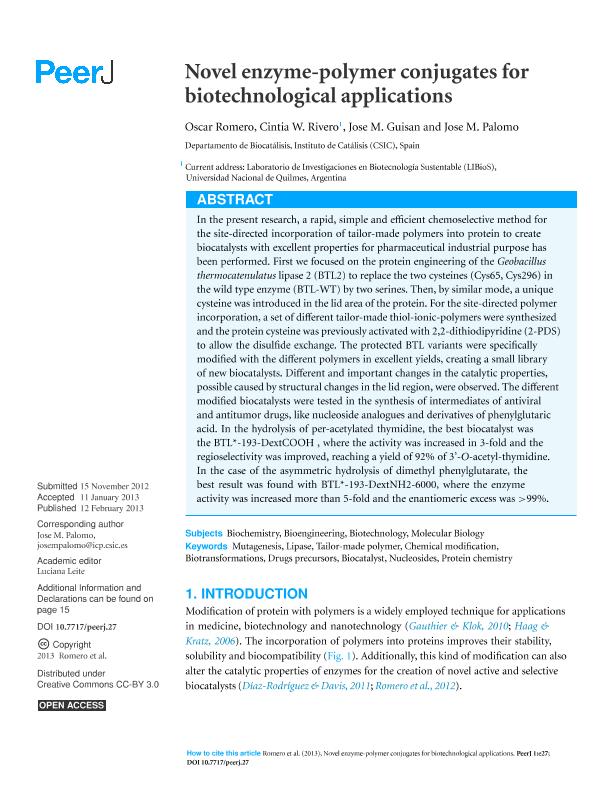Mostrar el registro sencillo del ítem
dc.contributor.author
Romero, Oscar Eduardo

dc.contributor.author
Rivero, Cintia Wanda

dc.contributor.author
Guisán, José M.
dc.contributor.author
Palomo, José M.
dc.date.available
2017-08-30T18:05:05Z
dc.date.issued
2013-01
dc.identifier.citation
Romero, Oscar Eduardo; Rivero, Cintia Wanda; Guisán, José M.; Palomo, José M.; Novel enzyme-polymer conjugates for biotechnological applications; PeerJ; PeerJ; 1-2013; 1-17; e27
dc.identifier.issn
2167-8359
dc.identifier.uri
http://hdl.handle.net/11336/23318
dc.description.abstract
In the present research, a rapid, simple and efficient chemoselective method for the site-directed incorporation of tailor-made polymers into protein to create biocatalysts with excellent properties for pharmaceutical industrial purpose has been performed. First we focused on the protein engineering of the Geobacillus thermocatenulatus lipase 2 (BTL2) to replace the two cysteines (Cys65, Cys296) in the wild type enzyme (BTL-WT) by two serines. Then, by similar mode, a unique cysteine was introduced in the lid area of the protein. For the site-directed polymer incorporation, a set of different tailor-made thiol-ionic-polymers were synthesized and the protein cysteine was previously activated with 2,2-dithiodipyridine (2-PDS) to allow the disulfide exchange. The protected BTL variants were specifically modified with the different polymers in excellent yields, creating a small library of new biocatalysts. Different and important changes in the catalytic properties, possible caused by structural changes in the lid region, were observed. The different modified biocatalysts were tested in the synthesis of intermediates of antiviral and antitumor drugs, like nucleoside analogues and derivatives of phenylglutaric acid. In the hydrolysis of per-acetylated thymidine, the best biocatalyst was the BTL*-193-DextCOOH , where the activity was increased in 3-fold and the regioselectivity was improved, reaching a yield of 92% of 3’-O-acetyl-thymidine. In the case of the asymmetric hydrolysis of dimethyl phenylglutarate, the best result was found with BTL*-193-DextNH2-6000, where the enzyme activity was increased more than 5-fold and the enantiomeric excess was >99%.
dc.format
application/pdf
dc.language.iso
eng
dc.publisher
PeerJ
dc.rights
info:eu-repo/semantics/openAccess
dc.rights.uri
https://creativecommons.org/licenses/by/2.5/ar/
dc.subject
Biocatalyst
dc.subject
Nucleosides
dc.subject
Lipase
dc.subject
Drugs Precursor
dc.subject.classification
Bioprocesamiento Tecnológico, Biocatálisis, Fermentación

dc.subject.classification
Biotecnología Industrial

dc.subject.classification
INGENIERÍAS Y TECNOLOGÍAS

dc.title
Novel enzyme-polymer conjugates for biotechnological applications
dc.type
info:eu-repo/semantics/article
dc.type
info:ar-repo/semantics/artículo
dc.type
info:eu-repo/semantics/publishedVersion
dc.date.updated
2017-08-22T21:25:00Z
dc.journal.pagination
1-17; e27
dc.journal.pais
Estados Unidos

dc.description.fil
Fil: Romero, Oscar Eduardo. Consejo Superior de Investigaciones Cientificas; España
dc.description.fil
Fil: Rivero, Cintia Wanda. Universidad Nacional de Quilmes. Departamento de Ciencia y Tecnología. Laboratorio de Investigación en Biotecnología Sustentable; Argentina. Consejo Nacional de Investigaciones Científicas y Técnicas; Argentina
dc.description.fil
Fil: Guisán, José M.. Consejo Superior de Investigaciones Cientificas; España
dc.description.fil
Fil: Palomo, José M.. Consejo Superior de Investigaciones Cientificas; España
dc.journal.title
PeerJ
dc.relation.alternativeid
info:eu-repo/semantics/altIdentifier/doi/http://dx.doi.org/10.7717/peerj.27
dc.relation.alternativeid
info:eu-repo/semantics/altIdentifier/url/https://peerj.com/articles/27/
Archivos asociados
